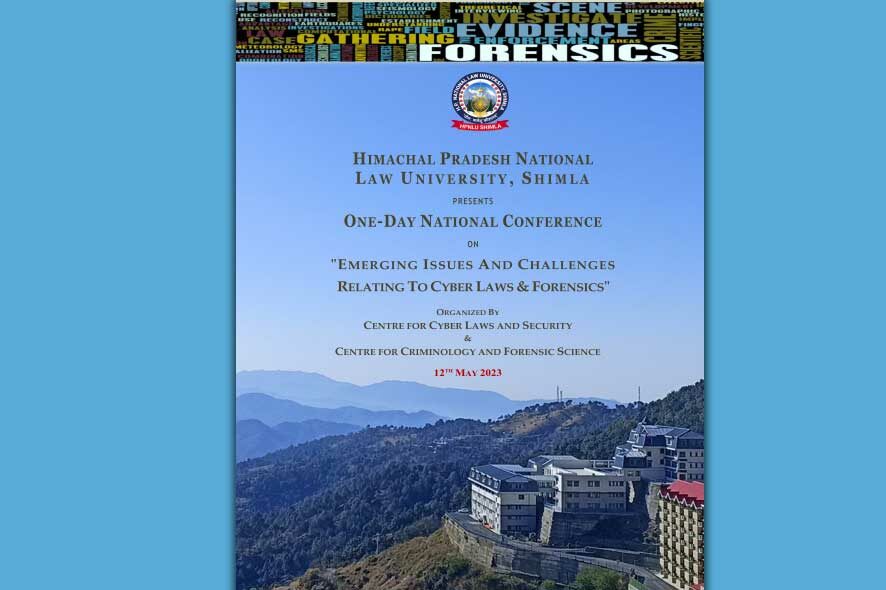About HPNLU Shimla
The Himachal Pradesh National Law University (HPNLU, Shimla) was established by the State Government in the year 2016 by an Act of the Legislature (Act 16 of 2016). The University started functioning on the 5th of October 2016. Located in the geographical terrains of the Himalayas, HPNLU, Shimla, is the best place for studying and learning in law, developing students, understanding about law and legal system, topographies of law-making, legal practice and administration. Led by the visionary scholar of law, Hon’ble Vice-Chancellor Professor (Dr.) Nishtha Jaswal, the University, has proactively organized events encompassing a wide spectrum of socio-legal issues. In a short stretch of time, the University has made its mark in legal education by following a forward-looking approach and taking off the beaten paths to enhance the academic potential of its faculty members, students, and research scholars.
About the Conference
The National Conference on Emerging Issues and Challenges relating to Cyber Laws & Forensics aims to examine and analyze the emerging cyber law and forensics, cybercrime, and cyber security trends of today’s times and to bring the researcher, academicians, legal practitioners, and industry professionals on the same platform to identify the issues involved in the cyber law sector and its interface with the threat to forensics and cyber security.
Call for research papers
The conference invites research papers on the Multidisciplinary subjects of Law, Forensic Science, and Informational Technology. In preparing the abstracts of their proposed papers, we encourage prospective participants to engage with cyber law and forensics issues, as highlighted in the conference theme.
The Conference will be conducted in Blended (Physical and Virtual) Mode. The paper presentations will be in virtual mode only.
The theme for the conference is ‘Emerging Issues and Challenges Relating to Cyber Laws & Forensics’:
Eligibility
Academicians, Researchers, Students, Cyber Professionals, Cyber Stakeholders, Cyber Forensic Experts, Advocates, Forensic Science professionals, Forensic Science Professors, and Information Technology Professionals.
Sub-Themes
Digital Forensics and Cyberspace
-
Technological Advancements in Digital Forensics
-
Cyber Crime Investigation and Cyber law and forensics
-
Data Protection and Role of Forensic
-
Forensic and Digital Evidence: Statutory Implications
-
Cyber Security in Digital Court Management
-
Computer based Cyber law and forensics and Mobile based Forensics
Cyber Crimes and Investigation
-
Security against Piracy Threats
-
National Cyber Crime Reporting Portal
-
Intermediary Liability in Cyber Crime
-
Cyber Crimes and Cyber Terrorism
-
Cyber Security and Data Protection – Need of New Enactment
-
Cyber Crimes against Women and Children
Information Technology and Cyber Space
-
Big Data in Cyberspace
-
Block Chain Technology and Cryptography
-
Artificial Intelligence
-
Convergence of New Technology and Limitation of Forensics
-
5G Technology and Cyberspace
-
Augmented Reality and Cyberspace
Forensic science and Criminal Investigation
-
Crime Scene Investigation
-
Forensic Psychology and Crime Investigation
-
Investigative techniques in Forensic Science
-
Collection and Preservation of Forensic Evidence
-
Role of DNA Profiling Technology
-
Role of Forensics in Identification of Accused and Victim
-
Role of Toxicology, Serology and Narcoanalysis in Investigation
-
Forensic Psychology: Brain Mapping, Polygraph and Narco-Analysis
-
Forensic Evidence and Expert Opinion
Forensic Science and Civil Jurisdiction
-
Forensic Audit and Finance
-
Role of Forensics in Disaster Management
-
Forensics and Money Laundering
-
Tax Evasion and Forensic Audit
-
Questioned Documents and Forensics
Constitutional Aspects of Digital and Forensic Evidence
-
Admissibility of Forensic Evidence
-
Digital Evidence and Constitutional Parameters
-
Judicial Response and Recognition to Digital Evidence
-
Cyber Law and Human Rights.
-
Constitutional Validity of Polygraph and Narco-analysis
Submission and Formatting Guidelines
For the Submission and Formatting guidelines kindly refer to the brochure
Registration Fees
-
Registration charges for Academicians /other professionals: Rs. 1000/-
-
Registration charges for Research scholars/students: Rs. 500/-
Registration for witnessing the proceedings can be submitted any time on or before 25th April 2023. Certificates for actual participation shall be issued after the event’s completion or mailed after the conference’s completion. No certificate shall be issued in absentia, and registration charges shall not be refunded at any stage.
Publication of Conference Proceeding
Selected papers will be published in the conference proceedings. We will review the papers as per the following guidelines:
-
Papers will be reviewed independently by at least two scholars through a double-blind peer review process, allotted on a random basis;
-
The review will be based on the scientific rigor of the paper, the originality of the research, and its relevance to the conference themes;
Notifications of acceptance will be sent to your official email based on the review. The university may publish selected papers of high quality appropriately
Important Dates
Bank Details
Account Number: 38109063445
Name: HIMACHAL PRADESH NATIONAL LAW UNIVERSITY
Corporate Address/Branch: GHANDAL (63954)
IFS Code: SBINO063954
Contact Information
In case of any query:
E-mail: conference.clfs@hpnlu.ac.in,
Mr. Swastik Grover (Convener) +91 8219059577,
Ms. Akshara Popli (Co-Convener) +91 8586067100
To know more click on Conference Brochure







